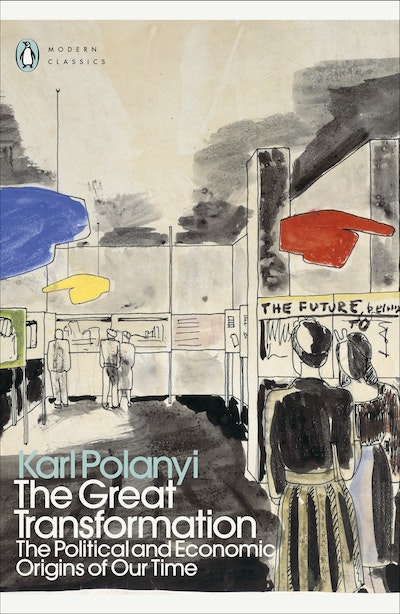The Great Transformation
The Political and Economic Origins of Our Time
- Published: 20 June 2024
- ISBN: 9781802065169
- Imprint: Penguin eBooks
- Format: EBook
- Pages: 384
‘One of the most powerful books in social sciences ever written. Polanyi convincingly shows that market fundamentalism, the religion of competition and the commodification of social relations largely contributed to fragilize Western societies and to lead to the authoritarian and totalitarian nightmare of 1914-1945. The same risk applies today at the global scale. A must-read.’
Thomas Piketty
With this book Karl Polanyi explained the rise of fascism in the 1920s and 30s. Today his great work sheds light on the worldwide rise of authoritarianism, and on our predicament. It is as essential and relevant as it was in 1944.
Ann Pettifor
Polanyi's vision for an alternative economy re-embedded in politics and social relations offers a refreshing alternative
Guardian
Polanyi exposes the myth of the free market
Joseph Stiglitz
The twentieth century’s most prophetic critic of capitalism . . . The Great Transformation, written for a broad audience, is witty and passionate as well as erudite
Prospect
His masterpiece
New Yorker
His magnum opus . . . a totem for social democracy
Dissent
A vital counterpoint to the hegemony of political economics . . . one of the century’s classics
Boston Review
[The Great Transformation] did more than any work of that generation to broaden and deepen the critique of market societies
Progressive
Polanyi’s revolutionary work is a must-read for anyone interested in understanding the complexities of our economic systems and debunking the myths around the free market
Mariana Mazzucato
As the Second World War was drawing to a close in 1944, two great works of political economy were published. One was Hayek’s The Road to Serfdom, the driving force behind the free-market revolution in the final quarter of the twentieth century. The other was Karl Polanyi’s The Great Transformation . . . [It] is well worth reading
Guardian
Karl Polanyi’s classic book describing the great transformation of European civilization from the preindustrial world to the era of industrialization, and the shifts in ideas, ideologies, and social and economic policies accompanying it . . . often seems as if [he] is speaking directly to present day issues
Joseph E. Stiglitz
The Great Transformation provides the most powerful critique yet produced of market liberalism . . . it is indispensable for understanding the dilemmas facing global society at the beginning of the twenty-first century
Fred Block
In The Great Transformation, published in 1944, the same year as Friedrich Hayek’s The Road to Serfdom, Karl Polanyi argued that human beings would not long tolerate living under a truly free-market system. Experience of the past four decades has vindicated this point of view
Martin Wolf
Read The Great Transformation today. Karl Polanyi’s striking insights into the free-market fantasies and failed financial foundations of 19th century civilization hit home hard, as our own global order totters and slouches toward Armageddon – and once again a new system struggles to be born. You will be astonished at the everlasting relevance of this extraordinary book
James K. Galbraith
We live in an age of backlash against neoliberalism and hyper-globalization, which shows that Polanyi’s insights on the tension between markets, on the one hand, and social stability and protection, on the other, remain as relevant as ever. I hope this edition will make him better known to a new generation of readers, preventing future leaders from committing the errors of past generations
Dani Rodrik, Harvard University
A seminal book . . . Polanyi’s ideas are now more relevant than ever in our times of overlapping economic and political crises, where pressing questions are being raised about the future of the international economy and global politics
Ayse Bugra, Bogaziçi University
Karl Polanyi’s most fundamental contribution was questioning putting the economy at the centre of civilization, and insisting that the economy is a social construct. This idea was as relevant in 1944 when The Great Transformation was first published, as it is today . . . It is my hope that with this new edition, this important book will reach a new generation of readers and inspire continued critical discourse on the political and economic challenges facing humanity
Kari Polanyi Levitt, McGill University


